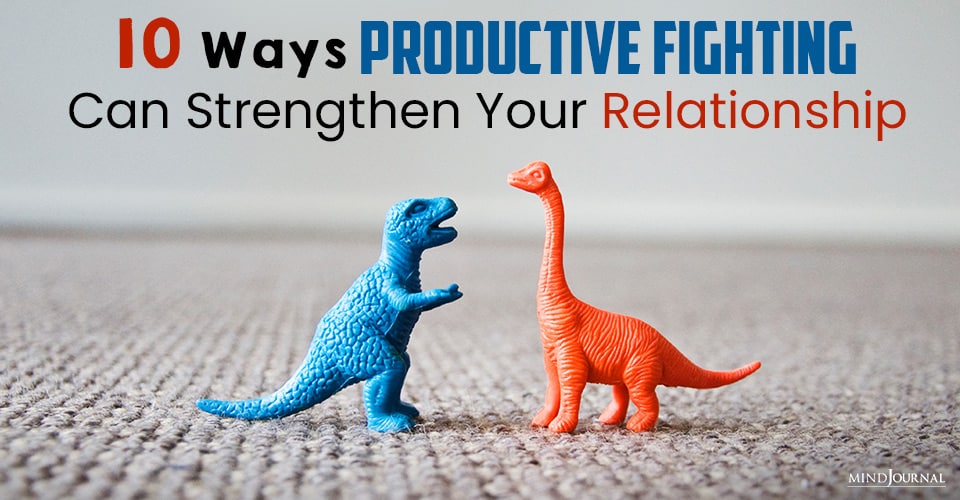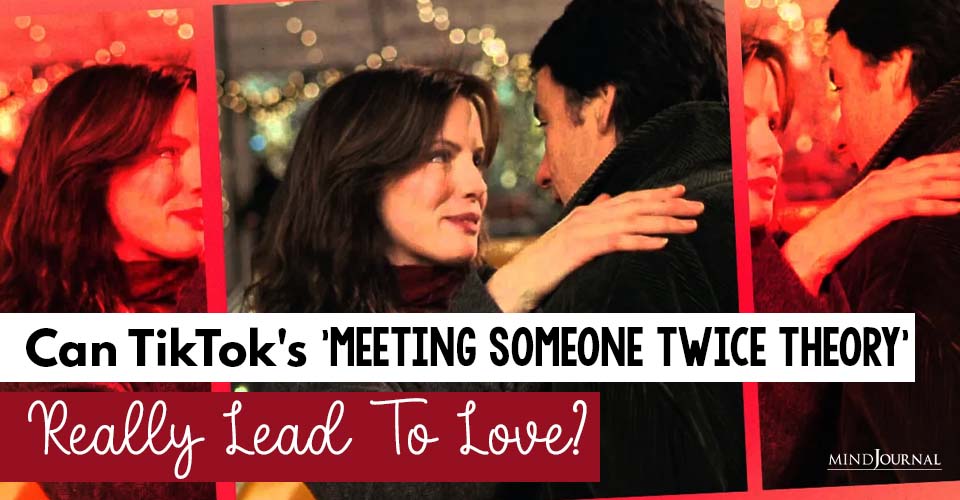Disagreements and the occasional arguments are normal in every relationship, but the difference between a healthy and unhealthy relationship lies in how you argue with each other when things are not that perfect and ideal. Do you engage in productive fighting or destructive fighting?
Not All Fighting Is Equal
Fighting, arguing, and disagreeing are usually the things you want to avoid in a relationship. Seldom do we think about arguing as something that could be considered constructive or even helpful inside a healthy relationship.
This article will define productive fighting vs destructive fighting and how disagreements in the right context can strengthen a relationship, as well as the warning signs that fighting in your relationship lies on the destructive side of the line. Lastly, I will give you 10 strategies to help make the disagreements in your relationship as productive as possible.
What Is Productive Fighting
We need disagreements in our relationships to be able to parse out the different places and opinions we might have about different topics, and decisions we need to make in our lives.
First, let’s think about what “fighting” actually is and clarify what we mean when we talk about productive fighting, as the word fighting is often misused or used in a very general way to describe any kind of disagreement or argument.
I think of productive fighting as two people with differing thoughts and ideas about an action or event, who actively engage in a conversation, (might be interpreted as an argument) to work through their differences and who come to a place of greater understanding about themselves or the situation.
I will talk more about destructive fighting below, but quickly, I will say that destructive fighting is a disagreement gone awry. When there is a destructive fight there are strong feelings that often get ugly. Disagreements, however, don’t have to be ugly. What many people are uncomfortable with, is the possibility that the disagreement could escalate, and for this reason, there is discomfort with any kind of disagreement.
Related: Relationship Conflict: 9 Signs Yours Is Unsolvable And Destructive
Very often in an argument or more destructive fight, there are things that are said that we later regret, or conversely, things are said intentionally to hurt the other person. I tend to think of fighting as unhealthy. However, the less heavy terms known as disagreement or arguing are where we see more health in the “fighting”.
So when we talk about productive fighting, what we are actually referring to is a healthy disagreement. However, we are all well aware that a disagreement can quickly escalate and turn into one of those ugly fights, which doesn’t leave any winners.
Depending on where you are at in your relationship, your fighting may look very different. It might be around children, where they should go to school, or if they should be taking medication to address ADHD for example. It might be around a decision on where to buy or rent a home, which neighborhood to be in, what are the important features of a location. And it might be a very routine matter like where to enjoy a night out or get something to eat.
Be it the big decisions or the more routine decisions, it is essential for any healthy relationship to work through the differences of opinion in a helpful productive manner.
In fact, having a difference of opinion is where the strength lies in disagreement, it is healthy to consider another way of thinking about a situation and how something might affect us and our family in a way that we had not really considered previously.
However, the manner in which this difference of opinion is expressed is what we could consider the pitfall of arguing. A healthy relationship does not shy away from arguing but rather is able to work through the differences and come to a place of increased understanding.

What Is Destructive Fighting
Destructive fighting is the ugly side of a disagreement. It is when there is no disguise that there is a heated disagreement that has become hurtful. Sometimes it might leave both people feeling distraught, unsettled, frustrated, or just angry. Anger does not have a place in a productive fight, if you are feeling angry in the disagreement then it is important to recognize that anger and take a break.
I talk about ground rules below and this is one of them; identifying when either you, yourself or your partner has gone over the threshold from upset to angry. If you are angry and need a break it is best to take that break or suggest that you both take a break, if you see that your partner is angry. This is not to say that you can’t be in control of your anger, however, it tends to go south real quick when anger is involved, so better to quit while you are ahead.
If you do take that break in the argument, then it is also good to identify a time that you will be able to continue trying to work through the discussion or the problem area.
It is also important to recognize the influence of substances in arguments as well. Is it a pattern that when drinking or using other substances there is often a fight? If this is the case then this is something to address, either when not under the influence or with a therapist. We know that when under the influence of a substance, our inhibitions are lowered and so what we might keep under wraps day-to-day, will be more likely to come out when under the influence.
If destructive fighting coincides with substance use then this is something to pay attention to and likely implies a larger challenge in the relationship that will need to be addressed together.
I would say most other feelings like frustration and being upset with the direction of the argument are real feelings that can work to bring a couple back together again, if both sides are committed to that.
Related: Transforming Criticism into Wishes: A Recipe for Successful Conflict
Warning Signs that Fighting In Your Relationship Is Not Healthy
This can be a little complicated to define, however, I think the most important factor in deciphering this question, is to listen to your gut, I talk about this with clients a lot, when struggling to answer these questions for themselves. We all have an internal barometer around what is ok and what is not. This is true in productive fights as well, what is ok and productive in one relationship may not be the case in another relationship.
We all have our own personal experiences with fighting, disagreements, and arguing, which often originate from our lives as children and what we were exposed to growing up, this will likely impact our comfort with disagreements and what we feel comfortable with. Another rule which I highlight below is to respect the person who is less comfortable with the situation, which should always be the default in an argument or fight.
I talk extensively about unhealthy and even abusive relationships in an article entitled Depression and Domestic Violence; How to Stay Safe which can be found by clicking here.
The line between when healthy, productive fighting turns destructive can be a little blurry but as a general rule of thumb, consider these points or questions below:
1. Are any of the behaviors/tactics used to control the other person? For example, is the argument about one person not doing what the other person told them they could or couldn’t do, like seeing friends?
2. Gestures made to intimidate or frighten the other person.
3. Are threats used?
4. Does the fighting get physical?
5. Are words used to belittle, put down or hurt the other person?
How To Fight Healthy In Your Relationship
In my 25-year career as a social worker and therapist, I have worked with many people largely within the context of their relationships and I have seen how a healthy productive disagreement can work to support the growth of the relationship.
Nothing in life is stagnant, life forces us to change and to grow, the direction we go in is up to us and if we are willing to engage in this process with our partners by learning how to engage in a productive fight then we are one step ahead of the rest of them.
Related: 5 Tips To Help Overcome Relationship Conflicts
Below are 10 rules that you can use with your partner to think about how you can engage more proactively when there is a disagreement.
1. Set ground rules.
One of the first things you can do inside a healthy relationship is to think about the times that are difficult between you and your partner. Sit down together and think constructively about the fights that you may have had and identify the rules of engagement. This will likely be much of what I have identified below.

2. Listen to each other.
Ensure that you are listening more than you are speaking. Taking turns is a helpful strategy to make sure that you are listening more than talking to your partner or at least as much.
3. Use “I” statements.
Speak from your experience and try not to use the word, “you”. This puts people on the defensive and is rarely helpful when trying to engage in a positive, productive conversation. This will also keep you from blaming each other which has no place in a healthy disagreement. If you have a feeling about what your partner did, describe how what they did made you feel; “when you talked to… it made me feel…” rather than “you are trying to make me jealous by talking to …”.
4. Stay on topic, don’t bring up old issues from the past.
It’s important to work through one issue at a time, of course as time marches on we have more experiences with the person that may not have been fully resolved which is when they emerge in other arguments. If you have unresolved conflicts with your partner then it is important to address them separately.
5. A healthy argument is never physical. Ever!
This includes getting in someone’s face, putting your hands on them or them on you, or throwing objects. It also includes threats of physical harm to you or any other member of the family, be it 4 legged or 2 legged.
6. Stay engaged, no Stonewalling.
Don’t shut down and use silence as a way to gain power and control in the conversation, if you need a break, say it and decide together that you will come back to this at another time.
7. Respect the lowest measure of comfort in the argument or fight.
As I mentioned before, we all have a different barometer and different tolerance for arguments and fighting. Some people are ok with a lively discussion and others may identify that as an ugly fight. The rule of thumb should be the person with the lowest level of comfort.
8. Keep an open mind.
To engage in a productive argument, you must be able to hear what the other person is saying and not have any preconceived ideas. Don’t go into the argument with your mind made up about what did or didn’t happen for the other person, be open to seeing things differently than how you went into the discussion.
9. Respect what the other person is telling you.
You may disagree, which is a point to figure out, and probably why you are arguing in the first place, however, if someone is sharing what they think or feel, that needs to be respected. Maybe it will take time to process the feelings around what is being shared and that is ok.
The issue or point of tension may not be resolved that day, we all need time to come to terms with our feelings about something and respect needs to be there on both sides, sometimes it’s time to heal.
Related: The ABCs of Escalating Conflict and 7 Tips To Prevent Them
10. Maintain volume control, no yelling.
This is again, a matter that depends on personal comfort. Defer to the person with less tolerance for loud voices, many of us have different ideas about what yelling is, and the most respectful way to address that is to hear the person who is quicker to say that there is, in fact, yelling.
Couples counseling is another option. Many people consider couples therapy to be a desperate move or one that you only make when the relationship is in dire straits, however, this can actually be a true sign of strength. Sometimes we just need that third person to help us navigate a difficult topic or to help us develop the skills to communicate more effectively.
As I often say to many of my clients, counseling or therapy is a sign of strength rather than illness or a problem. The step to ask for help and get the support we all need is a brave step, be it personally or in a relationship.
Final Thoughts
I hope this article has helped you to think about conflict as a strength rather than something to run away from. A healthy conflict is evidence that no one person is in control of the relationship, and that both voices are present in decisions, which is a part of any healthy, high-functioning relationship. Where there is disagreement there is also the opportunity to learn and understand which is a necessary part of any vibrant relationship.
What are your experiences with conflict in your relationship? Are you able to work through your arguments constructively? Do you have any other ground rules that have worked for you and your partner?
Join the Upside Down Flan Community, a professional mental health forum where you will learn how you can turn YOUR life right side up, sign up here for my weekly newsletter where you will have access to all of my free mental health tools and easy tips!
Written By Meredith Flanagan Originally Appeared On Upside Down Flan










Leave a Reply